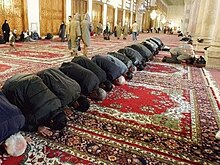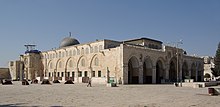Islam
| This article is part of a series on: |
| Islam |
|---|
 |
Islam (Arabic: الإسلام, Al-Islam (Submission)) is a monotheistic religion that was founded in the 7th century CE by Muhammad.[1] All of its teachings and beliefs are written out in the Quran (also spelled Qur'an or Koran), the holy scripture of Islam. Believers of Islam are called Muslims. They believe that the Quran was spoken to Muhammad by the angel Jibril, and that it is the word of Allah. They view Muhammad as a messenger. Other beliefs and rules about what Muslims should do come from reports of what Muhammad taught, or hadith.
Muslims believe that there were many other prophets before Muhammad since dawn of humanity, beginning with the Prophet Adam and including the Prophet Noah (Nuh), the Prophet Abraham (Ibrahim), the Prophet Moses (Musa), and the Prophet Jesus (Isa). They believe that all these prophets were given messages by God of the oneness of God to their communities at different times in history of mankind, but Satan (referred to as 'Shaytan' in Arabic) made the past communities deviate from the message of oneness and other social codes. Muslims believe that the content of the Quran (written in Arabic) is protected by Allah as mentioned in the Quran and is the final message of God for all of mankind until the day of judgment.
Most Muslims belong to one of two groups. The most common is Sunni Islam (71–80% of all Muslims are Sunni Muslims). The second is Shia Islam (10–20% of all Muslims are Shias – also called Shiites). But there are many more groups like the Alevis in Turkey.
With about 1.75 billion followers (23% of the world's population), Islam is the second-largest religion in the world. Islam is also the fastest-growing religion in the world. Islam is also the second-largest and fastest-growing religion in Europe.
Contents
Beliefs and practices[change | change source]

The Five Pillars of Islam[change | change source]
According to Islamic tradition, there are five basic things that Muslims should do. They are called "The Five Pillars of Islam":
- Tawheed: The Testimony (faith in English) is the core of the Muslim belief that there is no god but Allah himself, and that Muhammad is his last messenger.
- Salaat: Muslims pray five times per day, at special times of the day. When they pray, they face Kaaba, a large cubic structure located at the holy city of Mecca. Salat is namaz in Persian, Turkish and Urdu. Shia Muslims can pray the afternoon and evening prayers right after each other.[2]
- Zakaat: Muslims who have money must give a percentage of the money which it's still with them for a year 1/40th of their money (charity in English) to help people who do not have money or need help.
- Sawm or Siyam: Fasting during Ramadan, the ninth month of the Islamic year. Muslims do not eat or drink from dawn till sunset for one lunar month. After Ramadan, there is a holiday called Eid al-Fitr (which means "festival of end-fast" in English). On Eid al-Fitr, Muslims usually go to the mosque in the morning for a special religious service, and then have a party with families and friends.
- Hajj (Pilgrimage in English): During the month of Zulhejja, the 12th month of the Islamic Calendar is the pilgrimage season where many Muslims go to Mecca, the holiest city of Islam. However, if a Muslim is financially unable to perform the Hajj, it is not necessary for them to do so. Those who possess great financial capacity were the most obligated to perform the Hajj.
Quran[change | change source]
In Islamic belief, the Quran is the holy book of Islam and contained to words of Allah and is conveyed to the Prophet Muhammad by the archangel Jibraeel, who had been tasked since Adam as the conveyor of the words of God as guidance to mankind. The Quran is the central point of reference and is a link which connects humanity with God.
The Qur'an contains many passages and chapters which covers the entire aspect of humanity, down to the most minute detail. From the creation and conception of human child to the details of the Earth and beyond. In the aspect of human life it contains stories and tales of old civilizations and past prophets and their life chronicles. The Quran also contains the Syaria' law or hudud, and emphasizes the equal rights man and women alike with mothers given special status where it is sinful to even glare at them.
The Qur'an has a total of 30 juzuks. In each juzuk, contains many surahs or verses, with 114 surahs which begins with Surah al-Fatehah(The Beginning) and ended with Surah an-Naas(Humanity). A Hafeez is a Muslim who have commit the Quran to memory and can accurately recite every word in the Quran without flipping a single page an apply them to daily life.
Other important teachings in Islam are the Sunnah (which tell about Muhammad's life) and the Hadith (which are collections of dialogs of conversation that Muslims believe Muhammad said).
The Qur'an is considered in Islam as a manual to all of humanity and its teachings are to be implemented and shared by its readers.
Place of worship / Quran readings[change | change source]

Muslims pray in a place of worship called the mosque. A mosque is called a masjid in Arabic. Most mosques were mostly recognized having at least a single dome, and some have one or more towers. However many mosques were built without either domes or towers.
Muslims take their shoes off before entering the masjid to pray. Prayer is one of the most important things that a Muslim does.
Prayer[change | change source]
The Muslim is called to prayer or solah five times a day. This call to prayer is called Adhan. The muezzin, a man chosen to make the call to prayer, uses a loudspeaker, which carries his voice to the people nearby. The call to prayer is often done out loud, in public, in Muslim countries. Being called to solah is a normal part of daily life for most people in Muslim countries.
Muslims pray on a mat, which is called a prayer mat or prayer rug in English. Common Arabic names[3] for the prayer mat include sajjāda and namazlık.
When it is time to pray, Muslims face the direction of Qibla - the direction they are supposed to pray in, towards Mecca. They then roll out their prayer mat, and perform their prayers to God.
Peace be upon him[change | change source]
According to Islamic teachings, Muslims must say "Peace be upon him" (PBUH or pbuh) whenever they hear Prophet's name. In this way, they show respect to Muhammad and other prophets.
Islam in the world[change | change source]
In 2009, a study was done in 232 countries and territories.[4] This study found that 23% of the global population or 1.57 billion people are Muslims. Of those, between 75% and 90% are Sunni[5][6] and between ten and twenty five percent are Shi'a.[4][5][7] A small part belong to other Islamic sects. In about fifty countries, more than half of the people are Muslim.[8] Arabs account for around twenty percent of all Muslims worldwide. Islam has three holy sites; Jerusalem, Mecca and Medina.
Most Muslims live in Asia and Africa.[9] Around 62% of the world's Muslims live in Asia, with over 683 million followers in Indonesia, Pakistan, India, and Bangladesh.[10][11] In the Middle East, non-Arab countries such as Turkey and Iran are the largest Muslim-majority countries; in Africa, Egypt and Nigeria have the biggest Muslim communities.[12]
Most estimates indicate that the People's Republic of China has about 20 to 30 million Muslims (1.5% to 2% of the population).[13][14][15][16] However, data provided by the San Diego State University's International Population Center to U.S. News & World Report suggests that China has 65.3 million Muslims.[17] Islam is the second largest religion after Christianity in many European countries,[18] and is slowly catching up to that status in the Americas.
Different denominations[change | change source]
Like with other religions, over time different movements have developed in Islam. These movements are based on different interpretations of the scriptures. The following sections list the most common movements.
- Non-denominational Muslims are Muslims who don't follow any branch and simply call themselves Muslim. They are also called Ghayr Muqallids.
- The Muwahidin or Muwahid Muslims are a Muslim restoration movement that accepts mainstream Islam, but prefer to orient themselves towards a primacy of God's commands on issues pertaining to sharia law. Muwahidists believe that modern Islam has been mixed with many cultural traditions and they want to change that.
- The Shi'ites believe that just as only God can appoint a prophet, he can appoint a second leader after the prophet. Shi'a Muslims believe that God chose Ali as the leader after Muhammad. About 10-20% of Muslims are Shi'a which means that there are about 120 million world wide. Shi'a Muslims form the majority of Muslims in Iran, Azerbaijan, Bahrain, Iraq, and Lebanon. The largest adhab in Yemen is Zaydi Shia. Shias commonly gather for Day of Ashura in Karbala. They accept four hadiths.
- Sunnism considers Abu Bakr to be the successor of Muhammad. Sunnis make up roughly 75% of Muslims.[6][19] Sunnis believe that leaders of Islam should be chosen by the people of the Muslim world. After Abu Bakr died, Omar took his place, then Uthman, and then Ali. All of them were companions of Muhammad and lived in Medina. Sunni beliefs are typically based on the Qur'an and the Kutub al-Sittah (six hadiths). Sunnis are sometimes called Bukharists.
- The Sufi are a branch in Islam that focuses more on the spiritual and mystic elements of Islam. Sufis usually conclude their prayers with dhikr recitations.
- The Quraniyoon generally reject the authority of the hadiths. Such Muslims, also known as Quranists and Ahle Quran, believe that the Quran is the only source of guidance. They say the hadiths are not endorsed by the Quran, and some call them an innovative bid'ah.
- Ibadis are Muslims who originated from the Kharijites. Ibadis today have reformed beliefs from original Kharijites.
- Ahmadiyyas are Muslims who follow Mirza Ghulam Ahmed whom they consider to be the mahdi. They are divided into two subgroups; the Ahmadiyya Muslim Community and the Lahore Ahmadiyya Movement.[20]
- The Nation of Islam is a denomination in Islam primarily geared towards African Americans.
- The Five-Percent Nation, a denomination predominantly consisting of African Americans, also known as Nation of Gods and Earths.
Related pages[change | change source]
References[change | change source]
- Ernst, Carl (2004). Following Muhammad: Rethinking Islam in the Contemporary World. University of North Carolina Press. ISBN 0-8078-5577-4.
- Novak, David (February 1999). "The Mind of Maimonides". First Things.
- Sahas, Daniel J. (1997). John of Damascus on Islam: The Heresy of the Ishmaelites. Brill Academic Publishers. ISBN 978-90-04-03495-2.
- Seibert, Robert F. (1994). "Review: Islam and the West: The Making of an Image (Norman Daniel)". Review of Religious Research 36 (1).
- Warraq, Ibn (2000). The Quest for Historical Muhammad. Prometheus. ISBN 978-1-57392-787-1.
- Warraq, Ibn (2003). Leaving Islam: Apostates Speak Out. Prometheus. ISBN 1-59102-068-9.
- Watt, W. Montgomery (1974). Muhammad: Prophet and Statesman (New ed.). Oxford University Press. ISBN 0-19-881078-4.
Footnotes[change | change source]
- ↑ "Islam | religion". Encyclopedia Britannica. Retrieved 2018-10-04.
- ↑ The Shia Imami Ismaili Muslims: A Short Introduction - Page 28, Jimmy R. Davis - 2007
- ↑ "Unique Arabic Islamic Boy Names in Urdu With Meanings A to Z List 2018". The Jobs Pk. Retrieved 2017-10-09.
- ↑ 4.0 4.1 Miller (2009), pp.4,11
- ↑ 5.0 5.1 Mapping the Global Muslim Population: A Report on the Size and Distribution of the World's Muslim Population: Main Page, Pew Research Center
- ↑ 6.0 6.1 Encyclopædia Britannica, Sunnite
- ↑ "The World Factbook — Central Intelligence Agency". www.cia.gov.
- ↑ Miller (2009), p.11
- ↑ "Islam: An Overview in Oxford Islamic Studies Online". Oxfordislamicstudies.com. 2008-05-06. Retrieved 2010-05-16.
- ↑ Secrets of Islam – U.S. News & World Report. Information provided by the International Population Center, Department of Geography, San Diego State University (2005).
- ↑ Miller (2009), pp.15,17
- ↑ "Number of Muslim by country". nationmaster.com. Retrieved 2007-05-30.
- ↑ "CIA – The World Factbook – China". Cia.gov. Retrieved 2009-06-15.
- ↑ "China (includes Hong Kong, Macau, and Tibet)". State.gov. Retrieved 2009-06-15.
- ↑ "NW China region eyes global Muslim market". China Daily. 2008-07-09. Retrieved 2009-07-14.
- ↑ "Muslim Media Network". Muslim Media Network. 2008-03-24. Retrieved 2009-07-14.
- ↑ Secrets of Islam, U.S. News & World Report. Information provided by the International Population Center, Department of Geography, San Diego State University.
- ↑ See:
- Esposito (2004) pp.2,43
- "Islamic World". Encyclopaedia Britannica Online.
|access-date=requires|url=(help)
- "Muslims in Europe: Country guide". BBC News. BBC. 2005-12-23. Retrieved 2006-09-28.
- "Religion In Britain". National Statistics. Office for National Statistics. 2003-02-13. Retrieved 2006-08-27.
- ↑ From the article on Sunni Islam in Oxford Islamic Studies Online
- ↑ Historical Dictionary of Islamic Fundamentalism - Page 22, Mathieu Guidère - 2012
Other websites[change | change source]
| Wikimedia Commons has media related to Islam. |
- Academic resources
- Patheos Library – Islam
- University of Southern California Compendium of Muslim Texts
- Divisions in Islam
- Online resources
- Islam, article at Encyclopædia Britannica
- Islam at the Open Directory Project
- Directories
- Islam (Bookshelf) at Project Gutenberg
- Islam from UCB Libraries GovPubs



